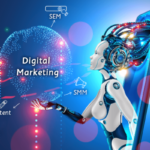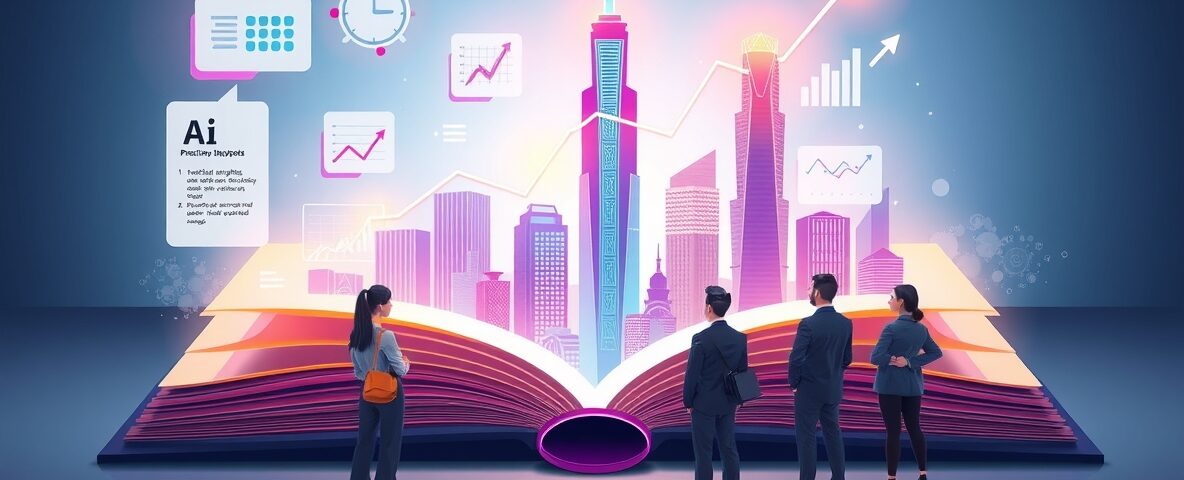
Marketing Made Smarter: Why Success-Driven Businesses Rely on AI Tools
September 17, 2025
AI Tools Unleashed: Redefining Marketing in the Digital Era
September 17, 2025In today’s digital age, AI marketing has become an essential strategy for businesses aiming to thrive in the highly competitive online landscape. This comprehensive guide will walk you through the fundamentals of AI marketing and how it can drive data-driven success in the digital age.
AI marketing, also known as artificial intelligence marketing, refers to applying artificial intelligence technologies, such as machine learning and natural language processing, to enhance marketing strategies, streamline processes, and deliver personalized customer experiences. It involves leveraging data-driven insights and automated decision-making to optimize marketing campaigns and achieve better results.
Data-driven marketing forms the foundation of AI marketing. By harnessing the power of data, marketers can gain valuable insights into customer behavior, preferences, and trends. This allows them to make informed decisions, create targeted campaigns, and deliver personalized experiences that resonate with their audience. Data-driven marketing improves marketing effectiveness and enhances customer satisfaction and loyalty.
The digital age has revolutionized the way businesses connect with their target audience. With the proliferation of digital channels and devices, customers have more choices and higher expectations. Marketers need to adopt innovative strategies and technologies that can effectively engage customers, drive conversions, and stay ahead of the competition. AI marketing catalyzes this digital transformation, empowering businesses to harness the power of data and automation to deliver exceptional customer experiences.

I. The Role of AI in Marketing
AI is crucial in transforming traditional marketing practices into data-driven, efficient, and customer-centric strategies. Let’s explore how AI can enhance customer insights, automate marketing processes, and optimize advertising and campaigns.
Enhancing Customer Insights
1. Predictive Analytics
AI-powered predictive analytics enables marketers to forecast customer behavior and preferences based on historical data. By analyzing patterns and trends, AI algorithms can identify potential customer churn, predict purchase likelihood, and recommend personalized offers. This empowers marketers to make data-backed decisions and deliver targeted messages that resonate with their audience.
2. Customer Segmentation
AI-driven customer segmentation enables marketers to divide their target audience into distinct groups based on common characteristics and behaviors. This allows for more personalized marketing campaigns tailored to each segment’s specific needs and preferences. Marketers can craft compelling messages that drive higher engagement and conversions by understanding customer segments at a granular level.
3. Personalization
Personalization is a crucial aspect of AI marketing. By leveraging AI algorithms, marketers can deliver personalized experiences to customers at scale. AI analyzes vast data to understand individual preferences and behaviors, allowing marketers to create tailored recommendations, personalized offers, and customized content. Personalization enhances customer satisfaction, increases brand loyalty, and drives revenue growth.
Automating Marketing Processes
1. Content Creation and Curation
AI-powered tools and platforms have made content creation and curation more efficient and effective. Natural language generation algorithms can automatically generate high-quality articles, blog posts, and social media content. Content curation platforms leverage AI to sift through vast data and curate relevant content for specific audiences. These AI-driven automation tools enable marketers to save time, streamline workflows, and focus on strategic initiatives.
2. Email Marketing Campaigns
AI has revolutionized email marketing by automating various aspects of the campaign lifecycle. AI-powered email marketing platforms can segment audiences, create personalized email templates, optimize send times, and predict the likelihood of email opens and conversions. This level of automation allows marketers to deliver highly targeted and timely emails that drive engagement and conversions.
3. Social Media Management
AI-powered social media management tools help marketers manage and optimize their social media presence effectively. These tools can automate social media posting, analyze engagement metrics, identify trending topics, and suggest content ideas. By leveraging AI for social media management, marketers can enhance their brand’s visibility, engage with their audience, and build meaningful relationships on social platforms.
Optimizing Advertising and Campaigns
1. Programmatic Advertising
Programmatic advertising utilizes AI algorithms to automate the buying and selling of ad inventory in real time. AI analyzes user data, browsing behavior, and demographic information to deliver highly targeted ads to the right audience at the right time. This improves ad relevancy, increases conversion rates, and maximizes return on ad spend.
2. Dynamic Pricing
AI-powered dynamic pricing enables businesses to optimize their pricing strategies based on real-time market conditions and customer demand. AI algorithms analyze competitor pricing, historical sales data, and market trends to adjust prices dynamically and offer personalized discounts. This enables businesses to stay competitive, maximize revenue, and meet customer expectations.
3. A/B Testing
A/B testing is a crucial technique for optimizing marketing campaigns. AI can automate the A/B testing process by continuously testing different ads, landing pages, and call-to-action variations. AI algorithms analyze the real-time performance data and identify the winning variation that generates the highest conversions. This iterative approach to A/B testing helps marketers refine their campaigns and improve their overall marketing performance.

II. Leveraging AI for SEO
Search engine optimization (SEO) drives organic traffic to websites. AI can significantly enhance SEO strategies by providing valuable insights, automating tasks, and optimizing on-page and off-page elements. Let’s explore how AI can revolutionize SEO practices.
Keyword Research and Analysis
1. Natural Language Processing (NLP)
AI-powered NLP algorithms can understand the context, meaning, and intent behind search queries. This allows marketers to identify relevant keywords and phrases that align with user intent. NLP also helps optimize content by suggesting related keywords, identifying semantic relationships, and improving overall content quality.
2. Competitor Analysis
AI can analyze competitor websites, backlink profiles, and content strategies to gain a competitive edge in SEO. By leveraging AI-powered tools, marketers can identify competitor keywords, understand their ranking strategy, and uncover opportunities to outrank them. This competitive intelligence enables marketers to make data-driven decisions and optimize their SEO efforts effectively.
3. Search Intent Identification
Understanding user search intent is crucial for effective SEO. AI can analyze search queries, user behavior, and content relevance to determine the purpose behind specific searches. This helps marketers create content that matches user intent, leading to higher rankings and increased organic traffic.
On-Page Optimization
1. Content Generation and Optimization
AI-powered content generation tools assist marketers in creating high-quality and engaging content. These tools use AI algorithms to generate content outlines, suggest relevant subheadings, and write content sections. Marketers can also leverage AI for content optimization by analyzing keyword density, readability, and content structure. This ensures that the content is optimized for search engines and provides value to the readers.
2. Meta Tags and Descriptions
AI can optimize meta tags and descriptions to improve search engine visibility and click-through rates. AI algorithms analyze the content and context of web pages to generate accurate and compelling meta tags and descriptions. This helps search engines understand the content better and entices users to click on the search results.
3. URL Structure and Site Architecture
AI can assist in optimizing URL structure and site architecture for better SEO performance. AI algorithms analyze website structure, URL hierarchies, and internal linking patterns to ensure a logical and user-friendly site architecture. This helps search engines crawl and index the website more effectively, improving rankings and visibility.
Off-Page Optimization
1. Backlink Analysis and Building
AI-powered tools can analyze backlink profiles, evaluate link quality, and identify opportunities for acquiring high-quality backlinks. By leveraging AI, marketers can discover relevant websites for outreach, analyze competitor backlinks, and develop effective link-building strategies. This helps improve domain authority, search engine rankings, and organic traffic.
2. Influencer Marketing
Influencer marketing is an essential aspect of off-page SEO. AI can help identify relevant influencers in a specific niche by analyzing social media data, audience demographics, and engagement metrics. AI-powered tools can also facilitate influencer outreach, campaign management, and performance tracking. This enables marketers to leverage the power of influencers to expand brand reach and drive targeted traffic to their websites.
3. Social Signals
AI can analyze social media data, sentiment analysis, and user engagement metrics to understand social signals. Social signals, such as likes, shares, and comments, indicate the popularity and relevance of content. Marketers can identify trending topics, gauge content performance, and optimize their SEO strategies by monitoring social signals.

III. AI-Powered Content Marketing
Content marketing is crucial in engaging audiences, building brand authority, and driving conversions. AI-powered technologies can significantly enhance content creation, distribution, and performance tracking. Let’s explore how AI can revolutionize content marketing.
Content Creation
1. Automated Writing Tools
AI-powered automated writing tools can assist marketers in generating high-quality and relevant content. These tools use natural language generation algorithms to create blog posts, product descriptions, and social media content. Marketers can provide input parameters such as topic, tone, and target audience, and AI algorithms will generate content accordingly. This significantly speeds up the content creation process and ensures consistent quality.
2. Content Curation Platforms
AI-powered content curation platforms help marketers discover and curate relevant content from various sources. These platforms use AI algorithms to analyze content relevance, engagement metrics, and audience preferences. Marketers can leverage these platforms to curate content that aligns with their brand values and resonates with their target audience. This enhances content variety, saves time, and positions brands as industry thought leaders.
3. Video and Image Generation
AI-powered tools can generate engaging videos and images without extensive manual editing. These tools use AI algorithms to analyze content and automatically create videos or photos that align with the desired style, format, and message. Marketers can leverage these tools to create compelling visual content for social media, website banners, and promotional videos.
Content Distribution
1. Content Management Systems (CMS)
AI-powered content management systems enable marketers to streamline content distribution and optimize user experiences. These systems use AI algorithms to analyze user behavior, preferences, and engagement patterns. Marketers can leverage AI to personalize content recommendations, deliver targeted messages, and optimize content placement. This helps improve engagement, increase time spent on site, and drive conversions.
2. Social Media Scheduling Tools
AI-powered social media scheduling tools help marketers optimize their social media presence and maximize engagement. These tools use AI algorithms to analyze audience behavior, peak engagement times, and content performance. Marketers can schedule their social media posts at the most reasonable times, ensuring maximum visibility and reach. AI-powered tools can also suggest relevant hashtags, optimize post captions, and recommend content ideas to enhance social media marketing efforts.
3. Email Marketing Automation
AI-powered email marketing automation platforms can significantly enhance email marketing campaigns. These platforms use AI algorithms to segment audiences, personalize email content, and optimize send times. Marketers can leverage AI to analyze customer behavior, purchase history, and engagement metrics to deliver targeted and highly relevant email campaigns. This improves open email rates, click-through rates, and conversions.

IV. AI and Customer Experience
AI has the potential to revolutionize the customer experience by enabling personalized interactions, 24/7 support, and intuitive interfaces. Let’s explore how AI is transforming the customer experience landscape.
Chatbots and Virtual Assistants
1. 24/7 Customer Support
AI-powered chatbots and virtual assistants provide round-the-clock customer support, ensuring instant responses to customer queries and concerns. These AI-driven conversational interfaces can understand natural language, provide relevant information, and execute simple tasks. Businesses can enhance customer satisfaction, reduce response times, and save on support costs by automating customer support.
2. Personalized Recommendations
AI-powered recommendation engines analyze customer preferences, purchase history, and browsing behavior to deliver personalized product recommendations. This enhances the customer experience by offering relevant suggestions, cross-selling, and upselling opportunities. Personalized recommendations not only increase customer satisfaction but also drive revenue growth.
3. Natural Language Processing (NLP)
AI-powered NLP technologies enable businesses to understand and respond to customer inquiries, feedback, and reviews. NLP algorithms can analyze customer sentiment, extract key insights, and provide actionable feedback to improve products and services. This allows businesses to proactively address customer needs, resolve issues promptly, and build strong customer relationships.
Voice Assistants and Smart Devices
1. Voice-Activated Search
AI-powered voice assistants like Siri, Alexa, and Google Assistant have become increasingly popular. Voice-activated search allows customers to perform hands-free searches, get instant answers, and execute tasks through voice commands. Businesses can optimize their content for voice search by using conversational language, answering frequently asked questions, and optimizing for featured snippets.
2. Smart Home Integration
AI-powered smart devices, such as smart speakers and home appliances, offer seamless integration and enhanced customer convenience. These devices can be controlled through voice commands, providing a personalized and intuitive experience. Marketers can leverage AI to develop smart home-compatible products and services that enhance customer experience.
3. Sentiment Analysis and Feedback Management
AI can analyze customer sentiment and feedback from various sources, such as social media, reviews, and surveys. Sentiment analysis enables businesses to understand customer opinions, identify trends, and respond appropriately. Businesses can continuously improve their products, services, and customer experiences by leveraging AI for sentiment analysis and feedback management.

V. Challenges and Ethical Considerations
While AI marketing offers significant benefits, it also presents unique challenges and ethical considerations that need to be addressed. Let’s explore some of the key challenges and ethical considerations associated with AI marketing.
Data Privacy and Security
AI marketing relies heavily on customer data for insights and personalization. Ensuring data privacy and security is of utmost importance. Marketers must comply with relevant data protection regulations, implement robust security measures, and be transparent about data collection and usage practices.
Algorithmic Bias
AI algorithms can inadvertently perpetuate biases present in the data they are trained on. Marketers need to be aware of potential biases in AI algorithms and take steps to mitigate them. This includes diverse and representative training data, regular algorithm audits, and ongoing monitoring for bias in AI-driven decision-making processes.
Transparency and Explainability
AI algorithms can be complex and difficult to understand. Marketers need to ensure transparency and explainability in AI-driven decision-making processes. Customers should have visibility into how their data is used, and marketers should be able to explain the reasoning behind AI-generated recommendations and personalization.
Human-AI Collaboration
AI should be seen as a tool to enhance human capabilities rather than replace them entirely. Marketers need to foster a culture of human-AI collaboration and leverage AI as a strategic enabler. This involves upskilling marketing teams, defining clear roles for humans and AI, and integrating AI technologies seamlessly into existing marketing workflows.
AI marketing is transforming the way businesses approach marketing strategies and customer experiences. By leveraging the power of AI, marketers can gain valuable insights, automate processes, optimize campaigns, and deliver personalized experiences to customers. However, addressing the challenges and ethical considerations associated with AI marketing is crucial to ensure responsible and effective implementation.
AI-driven technologies continue to evolve rapidly, and businesses must stay abreast of the latest advancements to remain competitive in the digital age. Embracing AI marketing can unlock new opportunities, drive growth, and create a distinct competitive advantage in the dynamic and data-driven landscape.


